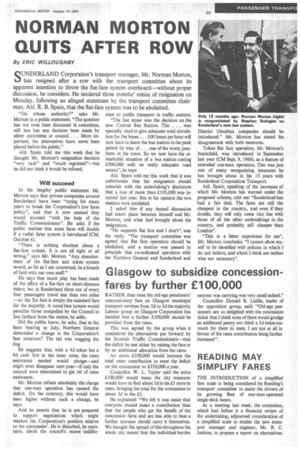NORMAN MORTON QUITS AFTER ROW
Page 51

If you've noticed an error in this article please click here to report it so we can fix it.
By ERIC WILLOUGHBY SUNDERLAND Corporation's transport manager, Mr. Norman Morton, 1.3 has resigned after a row with the transport committee about its apparent intention to throw the flat-fare system overboard—without proper discussion, he considers. He tendered three months' notice of resignation on Monday, following an alleged statement by the transport committee chairman, Aid. R. B. Spain, that the flat-fare system was to be abolished.
"On whose authority?" asks Mr. Morton in a public statement. "The question has not even been discussed in committee, still less has any decision been made by either committee or council . . . More important, the alternatives have never been placed before the public."
Ald. Spain told me this week that he thought Mr. Morton's resignation decision "very rash" and "much regretted"—but he did not think it -Would be refused.
Will succeed
In his lengthy public statement Mr. Morton says that private companies around Sunderland have been "trying for many years to break the Corporation's low fares policy", and that it now seemed they would succeed "with the help of the Traffic Commissioners". He asks if the public realizes that some fares will double if a radial fares system is introduced (CM, October 6).
"There is nothing absolute about a flat-fare system. It is not all right or all wrong," says Mr. Morton. "Any abandonment of the flat-fare and token system would, as far as I am concerned, be a breach of faith with our own staff."
He says that much play has been made of the effect of a flat-fare on short-distance riders; but in Sunderland three out of every four passengers travel less than two miles —so the flat fare is simply the standard fare for the majority. A zonal fare system would penalize those compelled by the Council to live farthest from the centre, he adds.
Did the public know, he asks, that at the fares hearing in July, Northern General demanded a change in the Corporation's fare structure? The tail was wagging the dog.
He suggests that, with a 4d token but a 6d cash fare in the inner zone, the rates assistance needed would plunge—and might even disappear next year—if only the council were determined to get rid of rates assistance.
Mr. Morton refutes absolutely the charge that one-man operation has caused the deficit. On the contrary, this would have been higher without such a change, he says.
And he asserts that he is not prepared to support negotiations which might weaken the Corporation's position relative to the companies'. He is disturbed, he maintains, about the council's recent indiffer ence to public transport in traffic matters.
"The last straw was the decision on the new Central Bus Station. This . . was specially sited to give adequate road circulation for the buses ... 300 buses per hour will now have to leave the bus station in the peak period by way of . . . one of the worst junctions in the town. So we now have the remarkable situation of a bus station costing £300,000 with no really adequate road access", he says.
Aid. Spain told me this week that it was unfortunate that the resignation should coincide with the undertaking's disclosure that a loss of more than £195,000 was incurred last year. But in his opinion the two matters were unrelated.
I asked him if any heated discussion had taken place between himself and Mr. Morton, and what had brought about the resignation.
"He supports flat fare and I don't", was the reply. "The transport committee was agreed that flat fare operation should be abolished, and a motion was passed in principle that co-ordinated operation with the Northern General and Sunderland and District Omnibus companies should be introduced." Mr. Morton has stated his disagreement with both measures.
Token flat fare operation, Mr. Morton's brainchild, was introduced in September last year (CM Sept. 9, 1966), as a feature of extended one-man operation. This was just one of many reorganizing measures he has brought about in his 15 years with Sunderland Corporation Transport.
Ald. Spain, speaking of the increases of which Mr. Morton has warned under the proposed scheme, told me: "Sunderland has had a fair deal. The fares are still the cheapest in the country, and even if they double, they will only come into line with those of all the other undertakings in the country, and probably still cheaper than London".
"This is a bitter experience for me", Mr. Morton concludes. "I cannot allow myself to be identified with policies in which I do not believe, and which I think are neither wise nor necessary".


































































































































